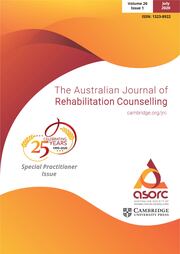No CrossRef data available.
Article contents
Influences on the Stages and Processes of Exercise Adoption in Women
Published online by Cambridge University Press: 15 October 2015
Abstract
The present study investigated the transtheoretical model of behaviour change in relation to exercise adoption and maintenance in a sample of 140 women. The aim was to examine the relationship between the stages of exercise change, and the constructs of processes of change, costs and benefits of exercising, self-efficacy, and self-rated health. Analyses revealed that the processes, pros, cons, self-efficacy, and self-rated health were significantly associated with stage of exercise adoption. Specifically, the processes fluctuated, pros and self-efficacy increased, and cons decreased across the stages from precontemplation to maintenance. A stage exercise adoption perspective may be particularly useful for understanding how women adopt and sustain exercise regimes.
- Type
- Articles
- Information
- The Australian Journal of Rehabilitation Counselling , Volume 12 , Issue 2 , 01 September 2006 , pp. 110 - 123
- Copyright
- Copyright © Cambridge University Press 2006


